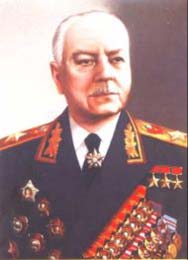Commander of the US 1st Marine Div from March 1942, was responsible for the division's combat training in preparation for its assignment to the South Pacific as the first marine division to go into combat against an enemy; arriving in New Zealand in June 1942 with only part of his division and with little useful intelligence of the current situation, nevertheless conducted successful amphibious landing at Guadalcanal at the beginning of August, in the first large-scale offensive against the Japanese of the Pacific War; for the initial assault and for the subsequent remarkable occupation and defense of the island, during which he contributed great leadership of the courageous but inexperienced American troops, was awarded the Navy Cross and the Medal of Honor; 1st Marine Div was relieved by Gen Patch's XIV Corps in December, was given command of the 1st Marine Amphibious Corps in July 1943, directing the operations at Bougaineville in November; was subsequently recalled to Washington to assume overall command of the Marine Corps, and was the first marine officer on active duty to become a four-star general.
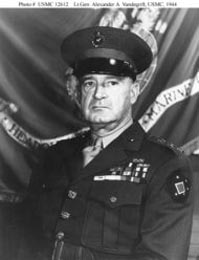
Soviet Deputy Chief of Operations from 1941 to January 1942 and subsequently Chief of the General Staff, had served in the Imperial Army before the revolution but had been rapidly promoted through the ranks of the Red Army; as Chief of the General Staff spent most of his time in the field as the representative of the Soviet High Command rather than in a supervisory capacity, and communicated regularly with Stalin, through his Moscow liaison, Antonov; also participated in the planning of the fronts at the Battle of Stalingrad and subsequently co-ordinated the activities of the 2nd and 3rd Belorussian Fronts in Belorussian and East Prussia; in 1945 was temporarily appointed C-in-C Soviet Armies in the Far East, and stood in as Stalin's deputy during his absence at the Yalta Conference.
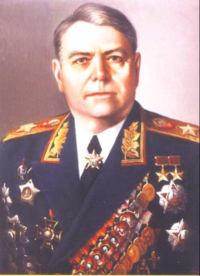
Soviet Head of General Staff Operations in 1941, and deputy fo Vasilevsky, was also a highly able Russian field commander who served with distinction at the Battle of Moscow in 1941 and later at Stalingrad, where he led the newly formed Southwest Front against the German 6th Army under von Paulus; in the later Kursk offensive, his forces halted Field Marshal Manstein's advance, counterattacking to take Kharkov; in December 1943, forces under his command retook Kiev in the Ukraine; was fatally wounded, apparently by Ukrainian nationalist partisans, in a car ambush on February 29, 1944;
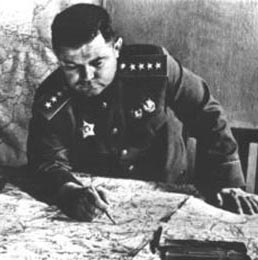
outstandingly successful British naval commander, who was captain of the Cossack during the Altmark Incident and subsequently commanded a destroyer flotilla in many dangerous and unorthodox Royal Navy operations in northern waters, including the evacuation of British troops from Namsos in Norway and the hunt for the Bismarck; given command of a cruiser squadron in the Mediterranean as a Rear Admiral, fought against Italian warships threatening supplies to Malta; was knighted in 1942, commanded an aircraft carrier force which supported the Salerno landings for the Allied invasion of Italy in September 1943, before being transferred to Britian to command the Eastern Task Force in Operation Neptune, the naval element of the Overlord plan for the invasion of Normandy in June 1944; after VE day, the Eastern Task Force was transferred to the Pacific where thy participated in the battle for Okinawa; after the war commanded the Royal Navy Home Fleet.
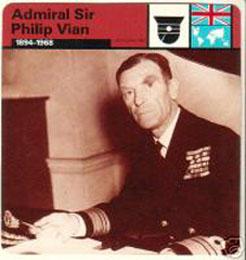
the prince of Naples ascended to the Italian throne in 1900; was a soldier during World War I; began a cordial relationship with future Fascist dictator Benito Mussolini; opposed Italian involvement in World War II, and, as the war turned against Italy, eventually opposed Mussolini; ratified the terms of Italy's surrender to the Allies in September 1943, but because of his long association with fascism, responded to public opinion and abdicated in May 1946, at which time Italy became a republic.
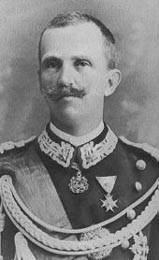
successor to Field Marshal Kesselring as German C-in-C in Italy for the last few months of the war in Europe; commanded a panzer division in Poland, a corps in the Western Offensive and an army on the Eastern Front before being promoted to colonel general in command of the German 10th Army in southern Ital in mid-1943; his particular contribution to the exceptional and prolonged defensive campaign in Italy directed by Kesselring - against larger and better equipped Allied forces - is widely acknowledged; in March 1945, replaced Kesselring, who had been transferred to the Western Front, as C-in-C; along with Gen Karl Wolff, Italian military governor and head of the SS in Italy, was involved almost immediately in secret negotiations with OSS Bureau chief Allen Dulles for the capitulation of German forces in Italy; the talks culminated in the surrender of his forces six days before the general armistice in Europe was declared.
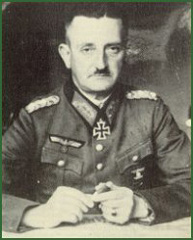
Anti-Stalinist and anti-Soviet Russian general who had served as an adviser to Chiang Kai-shek 1938-39 and commanded the 20th Army at the Battle of Moscow in 1941, for which he was awarded the Order of the Red Banner; was captured in May 1942 at Sevastopol and was subsequently exploited by the Germans as a figurehead for the Russian Liberation Army, allowed to make propaganda broadcasts expressing the Red Army's distrust of Stalin and recruit soldiers from POW and forced labor camps, although Hitler's personal opposition largely limited the scope of his activities to auxiliary functions; after his successful defeat of the SS garrison at Prague in 1945, the ROA's only major action, surrendered to the US 7th Army but was handed back to the Russians in accordance with an agreement made at Yalta; was hanged, along with 6 other generals, in August 1946.
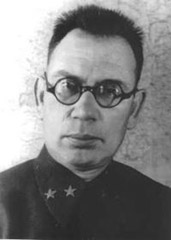
Russian Marshal of Artillery who was appointed as adviser to the Soviet High Command and figured prominently in operational planning and the re-equipment and tactical deployment of artillery throughout the war; Marshal Zhukov referred to the important part played by Voronov in planning the Soviet counteroffensive as Stalingrad.
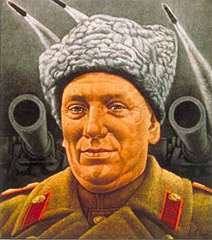
an early associate of Stalin and Commissar for Defense from 1934 to 1939; became Deputy Premier in the reshuffle of positions which followed the 'Russo-Finnish War'; in July 1941 becomes Deputy Chairman of the State Defense Committee and Stavka representative on the northwest front at Leningrad; after failing to check the German advance, to which his lack of modern military expertise certainly contributed, recalled to Moscow and subsequently held staff appointments for the rest of the war; contributed to the military talks with Generals Brooke and Wavell during Churchill's meeting with Stalin in Moscow in August 1942; as a member of the Defense Committee, attended several Allied Conferences, including Teheran in November 1943; after the war, became head of the Soviet Control Commission in Hungary and President of the USSR.
